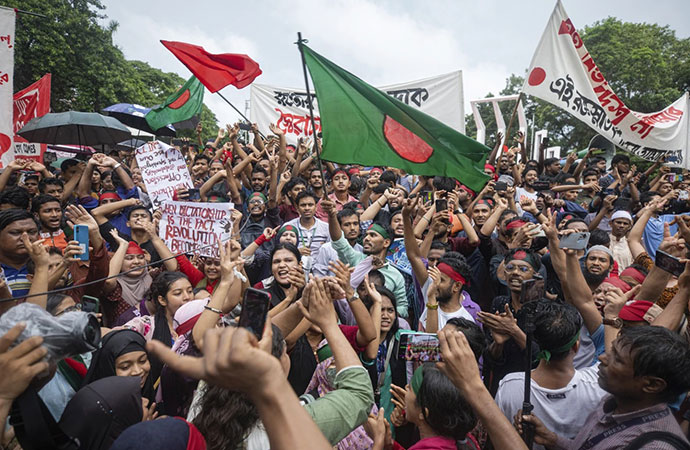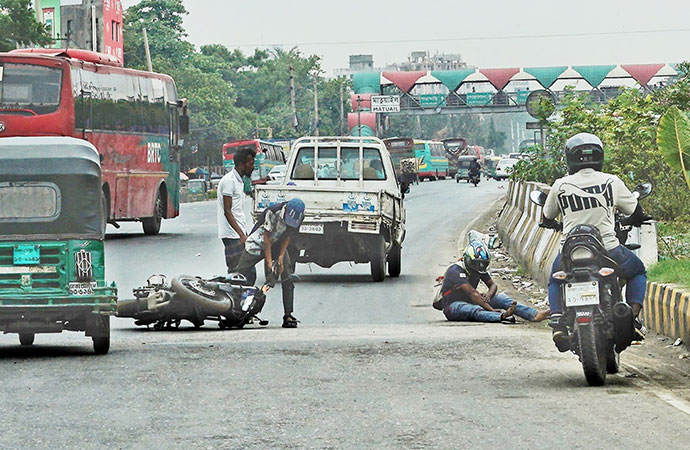Featured 1

Photo: AP/UNB
Despite provisions in the Penal Code and the Code of Criminal Procedure (CrPC) for punishing those who file them, the phenomenon of false cases has been a part of judicial dispensation in Bangladesh for pretty much its entire existence. Sensing the public sense of sympathy for the victims of the July-August Uprising in the present reality, we have seen numerous false cases filed that appear ridiculous from the get-go.
According to data from the police headquarters, almost 1500 cases were filed in connection with the incidents, including deaths and injuries during the Uprising. Among these, around 600 are murder cases, while the remaining 900 for other charges. At least 137 journalists have been implicated in 32 criminal cases, many for murder, filed over the incidents of July-August 2024. This week we learned about a case registered at the Mirpur police station on April 20, accusing Sheikh Hasina and 407 others, including 24 journalists, as well as actor Iresh Zaker (whose inclusion caused outrage on social media) of involvement in the killing of BNP activist Mahfuz Alam Shraban. In addition to murder and attempted murder, journalists have also been charged with unlawful assembly, rioting, abduction, vandalism, extortion, assault, and even genocide and crimes against humanity.
Last October, the Ministry of Home Affairs issued a warning against indiscriminate legal action. It stated that those engaged in such malpractices would face legal consequences. Furthermore, assurances were given by senior government officials that those wrongfully accused in these cases would not be subjected to any harassment. Inspector General of Police Baharul Alam has acknowledged that while an actual offence may have been committed by only 5 to 10 individuals, cases have been filed against as many as 300 people.
Prothom Alo took a closer look at 40 such cases, and their findings revealed a deeply disturbing picture. In many cases, individuals listed as plaintiffs were unaware of the cases filed using their names. It also found instances of extortion in exchange for promises to remove names of individuals from the list of accused. It even found one case where the natural death of a person has been misrepresented as a murder, with an absurd 768 individuals named as accused.
Acknowledging the prevalence of fake cases being filed, Law Adviser Asif Nazrul announced plans last December to establish a dedicated cell within the Law Ministry to provide legal assistance to the families of the July Revolution's martyrs to file cases. But there has been no word since on whether such a body was set up.
All of this isn't to say it's a new phenomenon of course. As mentioned at the start, this has afflicted our justice system as long as anyone can remember. The BNP, which was mainly on the receiving end for much of the 15 years under the Awami League, can often be heard reminding the public of its suffering. The party's standing committee member, Amir Khosru Mahmud Chowdhury, this week demanded accountability for the "harassment" of party leaders and activists through politically motivated false cases, demanding to know who will compensate them for their ordeals. But before considering the question of compensation, we should ask who can put an end to the practise first?

























Leave a Comment
Recent Posts
Pedaling Through the Mangroves ...
The journey from the bustling streets of Barishal to the serene, emera ...
Why the Interim Government mus ...
Two weeks out from what is expected to be a red letter day in the figh ...
Doesn’t matter who thinks what about Bangladesh deci ..
The Other Lenin
US President Donald Trump said his administration
Govt moves to merge BIDA, BEZA, BEPZA, MIDA